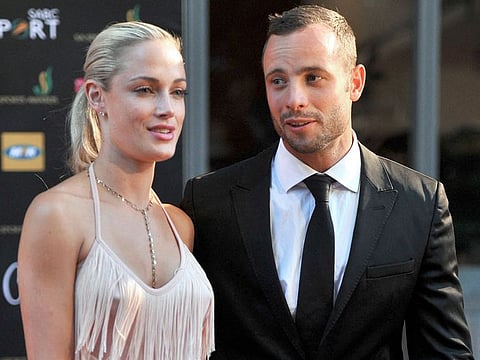Former Paralympian Pistorius seeks parole a decade after killing girlfriend
Oscar Pistorius shot and killed Reeva Steenkamp on Valentine's Day in 2013.

JOHANNESBURG: South Africa's former Paralympic star Oscar Pistorius, jailed in 2014 for killing his girlfriend Reeva Steenkamp, will get another chance for an early release at a parole hearing on Friday.
Known as the "Blade Runner" for his carbon-fibre prosthetic legs, Pistorius went from a public hero as a Paralympic champion to a convicted killer in hearings that caught the world's attention a decade ago.
Pistorius shot and killed Steenkamp on Valentine's Day in 2013.
He was initially jailed for five years in 2014 for culpable homicide by a high court but the Supreme Court of Appeal in late 2015 found him guilty of murder after an appeal by prosecutors.
He was sent back to jail for six years in 2016 after a High Court sentence, which was less than half the 15-year minimum term sought by prosecutors.
In 2017, the Supreme Court more than doubled his murder sentence to 13 years and five months, saying the six-year jail term was "shockingly lenient." A spokesperson for South Africa's Department of Correctional Services said a parole board would consider Pistorius' case at a hearing on Friday, where they will decide if he should be released on parole.
"The CSPB (Correctional Supervision and Parole Board) shall ... decide whether the inmate is suitable or not for social reintegration," said Correctional Services spokesperson Singabakho Nxumalo.
Pistorius' lawyer Conrad Dormehl told Reuters the hearing would take place in the Atteridgeville Correctional Centre near the capital Pretoria but declined to comment on their expectations from the hearing.
Several factors are typically taken into account by a parole board before inmates are released on parole.
These include the nature of the crimes, the possibility of reoffending, conduct in prison, physical and mental wellbeing and potential threats they may face if released.
Pistorius was denied parole in March after it was ruled that he had not completed the minimum detention period required to be considered for parole.
However, the Constitutional Court said in October that Pistorius had served half of his sentence by March 21 this year, which meant he was eligible for parole, after his sentence was backdated to July 2016 instead of November 2017.
Sign up for the Daily Briefing
Get the latest news and updates straight to your inbox






